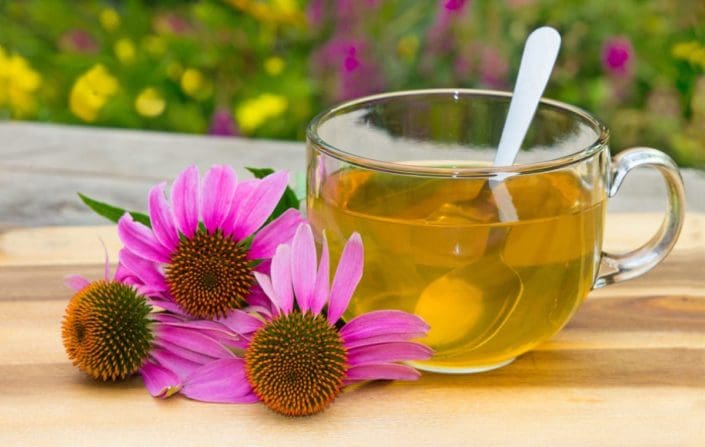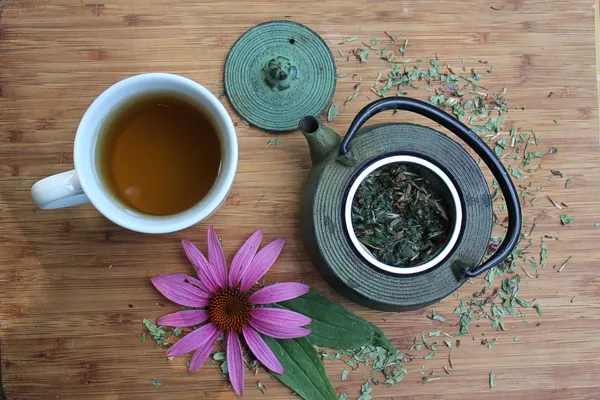The Power of Echinacea: A Natural Immune Booster
Echinacea tea has been used for centuries as a natural remedy to boost the immune system and treat various ailments. This article will explore the history of echinacea tea, its health benefits, and how to incorporate it into your daily routine.
Echinacea is a plant native to North America that has been used by Native Americans for its medicinal properties. The roots and leaves of the plant are used to make tea, which is known for its immune-boosting properties.
History of Echinacea Tea
Echinacea tea has a rich history that dates back to the Native Americans, who discovered the medicinal properties of the echinacea plant. The plant, also known as purple coneflower, was traditionally used to treat various ailments such as infections, wounds, and even snake bites.
In the 18th century, European settlers were introduced to echinacea by the Native Americans, who used the plant as a remedy for colds, flu, and other illnesses. The settlers quickly adopted the use of echinacea tea for its immune-boosting properties and its ability to help the body fight off infections.
Echinacea tea gained popularity in the United States in the 19th century, where it was widely used as a natural remedy for colds and flu. It was often brewed as a hot tea and sweetened with honey to help soothe sore throats and relieve congestion.
Over the years, echinacea tea has continued to be a staple in natural medicine cabinets around the world. Its history as a powerful immune booster and natural remedy for various ailments has solidified its place as a go-to herbal tea for those looking to support their overall health and well-being.

Health Benefits of Echinacea Tea
Echinacea tea is renowned for its numerous health benefits that can support overall well-being. Some of the key benefits of echinacea tea include:
- Boosting the immune system: Echinacea tea contains compounds that help stimulate the immune system, making it more effective at fighting off infections and illnesses.
- Fighting cold and flu symptoms: Drinking echinacea tea at the onset of cold or flu symptoms can help reduce the severity and duration of the illness. It can also help alleviate symptoms such as coughing, congestion, and sore throat.
- Anti-inflammatory properties: Echinacea tea has been shown to have anti-inflammatory properties, which can help reduce inflammation in the body and alleviate symptoms of conditions such as arthritis and sinusitis.
- Antioxidant effects: The antioxidants in echinacea tea help protect the body from damage caused by free radicals, which can contribute to various diseases and accelerate aging.
- Allergy relief: Some studies suggest that echinacea tea may help reduce allergy symptoms by modulating the immune response to allergens, providing relief for those suffering from seasonal allergies.
Boosting the Immune System
One of the most well-known benefits of echinacea tea is its ability to boost the immune system. Echinacea contains active compounds such as polysaccharides and alkamides that have been shown to enhance the activity of white blood cells, which are responsible for fighting off infections and illnesses.
By regularly consuming echinacea tea, you can strengthen your body’s natural defense mechanisms and reduce the risk of getting sick. This makes echinacea tea an excellent choice for those looking to support their immune system, especially during cold and flu season or times of increased stress.
Incorporating echinacea tea into your daily routine can provide an added layer of protection against common illnesses and help keep your immune system strong and resilient. So, next time you feel like you need an immune boost, reach for a cup of echinacea tea and let its natural healing properties work their magic.

Fighting Cold and Flu Symptoms
Echinacea tea is a popular natural remedy for alleviating cold and flu symptoms. The immune-boosting properties of echinacea can help reduce the severity and duration of colds and flu by enhancing the body’s defenses against viral infections.
When consumed at the onset of symptoms, echinacea tea can help strengthen the immune response, leading to a quicker recovery and lessening the intensity of symptoms such as congestion, coughing, and sore throat. Its soothing effects can also provide relief and comfort while the body fights off the illness.
By incorporating echinacea tea into your wellness routine during cold and flu season, you can support your body’s ability to combat respiratory infections and stay healthy throughout the year.
Anti-Inflammatory Properties
Echinacea tea is known for its anti-inflammatory properties, which can help reduce inflammation in the body and alleviate symptoms of inflammatory conditions such as arthritis and sinusitis. The active compounds in echinacea, such as flavonoids and polysaccharides, work to combat inflammation and promote healing.
Regular consumption of echinacea tea can help reduce swelling, pain, and stiffness associated with inflammatory conditions, making it a natural and gentle option for managing these issues. By incorporating echinacea tea into your daily routine, you can support your body’s natural healing processes and enhance your overall well-being.
Antioxidant Effects
Antioxidants are essential for protecting the body against oxidative stress and damage caused by free radicals. Echinacea tea is rich in antioxidants, such as flavonoids and phenolic compounds, which help neutralize free radicals and reduce the risk of chronic diseases and premature aging.
By incorporating echinacea tea into your diet, you can boost your antioxidant intake and support your body’s defenses against environmental toxins and pollutants. The antioxidant effects of echinacea tea can help promote radiant skin, improve cellular health, and reduce the risk of oxidative damage to cells and tissues.
Incorporating echinacea tea into your daily routine can provide a delicious and beneficial way to support your immune system, reduce inflammation, and protect your body against oxidative stress. Enjoy a soothing cup of echinacea tea and reap the numerous health benefits it has to offer.

Echinacea Tea and Allergies
Echinacea tea may offer relief for seasonal allergies due to its immune-modulating effects. Some studies suggest that echinacea can help regulate the body’s immune response to allergens, potentially reducing the severity of allergy symptoms such as sneezing, itching, and congestion.
By incorporating echinacea tea into your daily routine, especially during allergy season, you may experience relief from common allergy symptoms and support your body’s ability to cope with environmental triggers.
It is important to note that individual responses to echinacea tea may vary, and it is recommended to consult with a healthcare provider before using echinacea as a treatment for allergies or any other health condition.
How to Make Echinacea Tea
Making echinacea tea at home is simple and can be a soothing and therapeutic experience. Here’s a basic recipe to make a cup of echinacea tea:
Ingredients:
- 1 teaspoon dried echinacea herbs or 1 echinacea tea bag
- 1 cup of hot water
- Optional: honey or lemon for flavor
Instructions:
- Boil water in a kettle or saucepan.
- Place the dried echinacea herbs or tea bag in a cup.
- Pour the hot water over the herbs or tea bag.
- Let the tea steep for 5-10 minutes to allow the beneficial compounds to infuse into the water.
- Remove the herbs or tea bag from the cup.
- Add honey or lemon to taste if desired.
- Enjoy your cup of soothing echinacea tea.
You can adjust the strength of the tea by steeping it for a longer or shorter period of time, depending on your preference. Feel free to experiment with different additions such as ginger or cinnamon for added flavor and health benefits.
By making echinacea tea a part of your daily wellness routine, you can enjoy the immune-boosting and healing properties of this herbal remedy in a warm, comforting beverage.

Side Effects and Precautions
While echinacea tea is generally considered safe for most people when consumed in moderate amounts, it is important to be aware of potential side effects and precautions:
- Allergic reactions: Some individuals may have allergies to plants in the Asteraceae family, which includes echinacea. If you have known allergies to ragweed, marigolds, or daisies, you may also be allergic to echinacea and should avoid consuming it.
- Autoimmune conditions: Echinacea may stimulate the immune system, which could potentially worsen symptoms in individuals with autoimmune conditions such as rheumatoid arthritis or lupus. Consult with a healthcare provider before using echinacea if you have an autoimmune disorder.
- Interaction with medications: Echinacea can interact with certain medications, including immunosuppressants and drugs metabolized by the liver. If you are taking any medications, it is advisable to consult with a healthcare provider before using echinacea tea.
- Digestive issues: Some individuals may experience mild gastrointestinal side effects such as stomach upset or diarrhea when consuming echinacea tea. If you have a sensitive stomach, start with a small amount and monitor your body’s response.
It is always recommended to consult with a healthcare provider before using echinacea tea, especially if you have underlying health conditions, are pregnant or breastfeeding, or are taking medications.
Buying and Storing Echinacea Tea
When purchasing echinacea tea, it is important to choose high-quality, organic products to ensure purity and potency. Look for echinacea teas that contain only echinacea as the main ingredient, without added fillers or artificial flavors.
Echinacea tea can be found in health food stores, specialty tea shops, or online retailers. It is available in various forms, including loose dried herbs, tea bags, and pre-packaged blends with other herbs.
To store echinacea tea properly and maintain its freshness and quality, keep it in an airtight container in a cool, dark place away from moisture and sunlight. This will help preserve the flavor and beneficial compounds of the tea for longer periods.
Before purchasing echinacea tea, carefully read the product labels to ensure it meets your preferences and dietary requirements. Enjoy the immune-boosting and soothing benefits of echinacea tea by incorporating it into your daily wellness routine.
Incorporating Echinacea Tea Into Your Daily Routine
Incorporating echinacea tea into your daily routine can be a simple and enjoyable way to reap its many health benefits. Here are some tips on how to include echinacea tea in your daily regimen:
- Start your day with a soothing cup of echinacea tea to boost your immune system and set a healthy tone for the day.
- Enjoy a cup of echinacea tea as a mid-morning or afternoon pick-me-up to stay hydrated and support your overall well-being.
- Wind down in the evening with a relaxing cup of echinacea tea to promote relaxation and help you unwind before bedtime.
- Experiment with different flavors and blends of echinacea tea, such as adding lemon or honey for a twist on traditional recipes.
- Consider incorporating echinacea tea into your wellness rituals, such as meditation or yoga practice, to enhance the benefits of these activities.
By making echinacea tea a regular part of your daily routine, you can support your immune system, reduce inflammation, and enjoy the soothing effects of this herbal remedy.

Echinacea Tea vs. Echinacea Supplements
While echinacea tea and echinacea supplements both contain the beneficial compounds of the echinacea plant, there are some differences between the two forms:
Echinacea tea:
Echinacea tea is made by steeping the dried herbs of the echinacea plant in hot water, allowing the beneficial compounds to infuse into the liquid. Echinacea tea is generally more soothing and enjoyable to consume, making it a popular choice for those who prefer herbal remedies in liquid form.
Echinacea supplements:
Echinacea supplements are typically available in capsule or tincture form, providing a concentrated dose of echinacea extract for those who prefer a more convenient method of consumption. Echinacea supplements can be useful for individuals who may not enjoy the taste of herbal teas or prefer a higher potency of echinacea for specific health concerns.
When choosing between echinacea tea and supplements, consider your personal preferences, health goals, and ease of use. Both forms can offer immune-boosting and healing benefits, so choose the option that best suits your needs and lifestyle.
Conclusion
Echinacea tea is a popular and versatile herbal remedy with numerous health benefits, including immune-boosting, anti-inflammatory, and antioxidant effects. By incorporating echinacea tea into your daily routine, you can support your body’s natural defenses, reduce inflammation, and promote overall wellness.
When using echinacea tea, it is important to be aware of potential side effects and precautions, especially if you have allergies, autoimmune conditions, or are taking medications. Consult with a healthcare provider before using echinacea tea as a treatment for any health concerns.
Whether you enjoy a soothing cup of echinacea tea to fight off cold and flu symptoms, reduce inflammation, or support your immune system, this herbal remedy offers a comforting and beneficial way to enhance your well-being.
Also Read:



